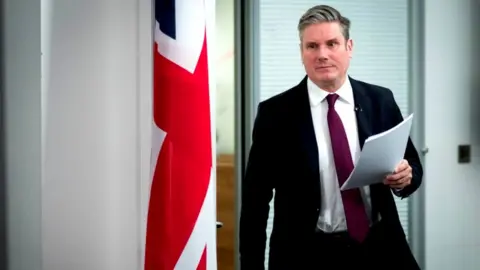'Leonard's Labour leadership just wasn't working'
 PA Media
PA MediaRichard Leonard's leadership of Scottish Labour was not working.
The party went backwards in national elections on his watch, losing both its Scottish seats in the last European elections and all but one of its Scottish MPs in the 2019 UK general election.
After three years in charge, he did not appear to be widely known or appreciated by the public according to opinion polls.
The same surveys have tended to suggest Labour - once the dominant force in Scottish politics - continues to trail the Conservatives in third place.
That his supporters say internal party critics have constantly undermined his leadership does not change the party's standing.
There was a glimmer of hope for them this week when a Sevanta/Comres poll of more than 1,000 adults for the Scotsman suggested Labour could be on 18% support in Holyrood constituency voting intentions, just one point behind the Tories.
That came too late.
According to Mr Leonard himself, continuing speculation about his leadership had become a "distraction" and after careful consideration over Christmas he decided to step down.
That struck me as odd because this is the same Richard Leonard who has until now doggedly resisted all attempts to oust him.
'Reluctant to get involved'
When several of his own MSPs called on him to quit four months ago he stood firm and insisted he would lead the party into the Holyrood elections due in May.
Some of his critics had come to accept that he was staying put. Others hoped for an intervention by the UK leader, Sir Keir Starmer.
While I am told by one Labour source that Sir Keir was very reluctant to get involved in the Scottish party leadership, another said he had "showed real steel" this week in effecting change.
 PA Media
PA MediaI am told he spoke with Richard Leonard earlier this week. The Times reports that Sir Keir told Mr Leonard he no longer had confidence in him. The UK party leader's office has declined to comment.
What we do know is that Richard Leonard remains his party's lead candidate for the Scottish Parliament on the Central Scotland list, which almost guarantees his return to Holyrood.
Two sources have told me that was part of an agreement reached with the help of trade unions including Mr Leonard's own - the GMB - to allow him a "dignified" departure from the leadership.
A source close to Mr Leonard said that was "not accurate" without issuing a complete denial.
The former Labour MP Gemma Doyle said any such deal "reeks of elite privilege" and could be challenged by the Scottish party's ruling body.
'Likely frontrunner'
That the UK party was frustrated with Scottish Labour's performance, upon which their own ambitions to form a UK government depend, is not in doubt.
At Westminster, some were particularly unimpressed when the Scottish party released a statement in Richard Leonard's name which appeared to undermine Sir Keir's decision to support the post-Brexit trade deal.
On that occasion, Anas Sarwar - the party's constitution spokesperson - issued a clarification.
He is now considered a likely frontrunner in any contest to succeed Mr Leonard, having lost out to him last time, when Mr Leonard's ally Jeremy Corbyn was the UK party leader.
Both Mr Sarwar and the party's health spokesperson, Monica Lennon, are understood to be considering standing.
Ms Lennon told BBC Radio Scotland's Drivetime programme that she had been having discussions with colleagues but was "ruling nothing in and ruling nothing out" at this stage.
There is not an obvious candidate from the Campaign for Socialism group of MSPs at Holyrood.
Jeremy Corbyn's former political secretary, Katy Clark, is seeking election to Holyrood but would be ineligible to stand, should she be interested, at this stage.
 PA Media
PA MediaAny contest is likely to be swift given how close the Holyrood elections are.
The new leader will have very little time to turn the party's fortunes around and their success or lack of it could have a bearing on the future of the UK.
There are Conservative and Liberal Democrat politicians who think a stronger Labour party is essential, if the SNP and its plans for another independence referendum are to be effectively countered.
As for Mr Leonard, he can justifiably take some credit for persuading the Scottish government to back Labour's policy of a national care service.
He may also take some comfort from knowing that even some of his harshest critics, within and beyond Scottish Labour, do not dislike him personally.
However much they disagree with his politics, they tend to respect him for approaching his work with a decency that is not universal among those we elect.